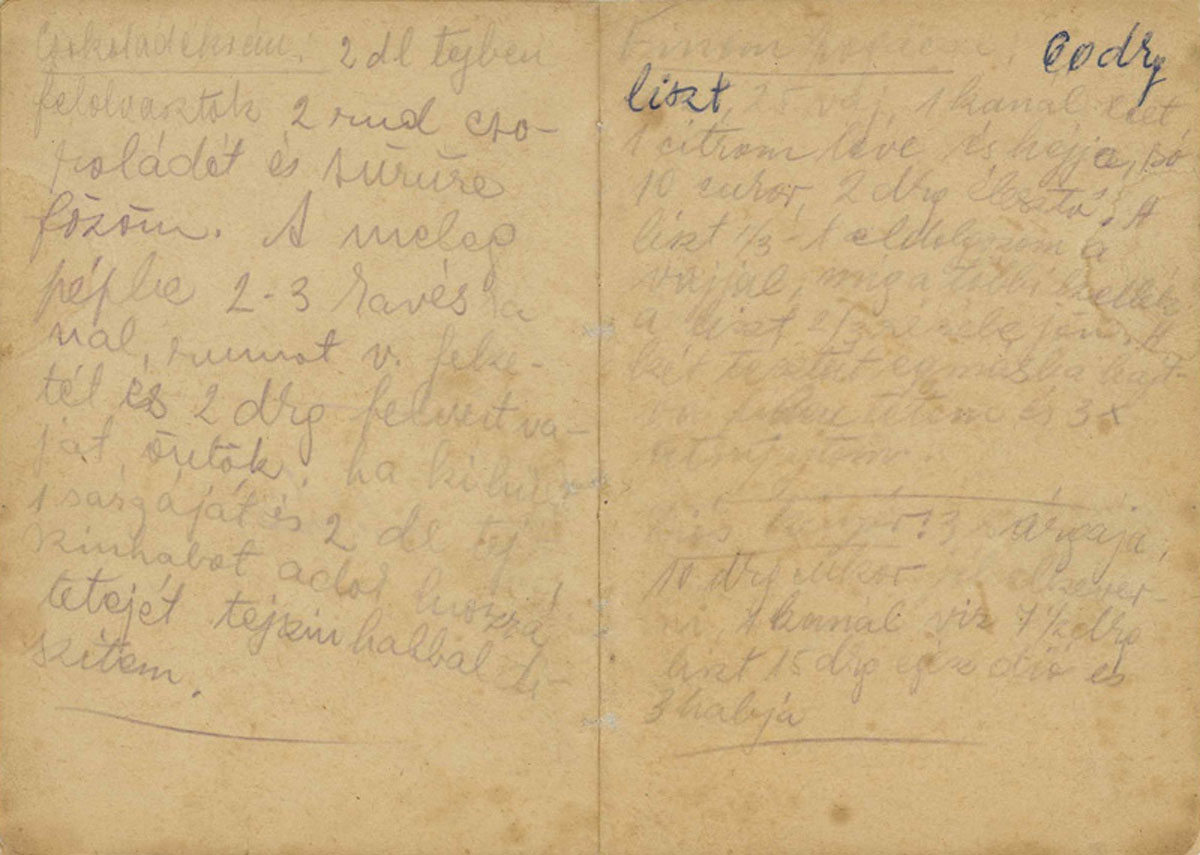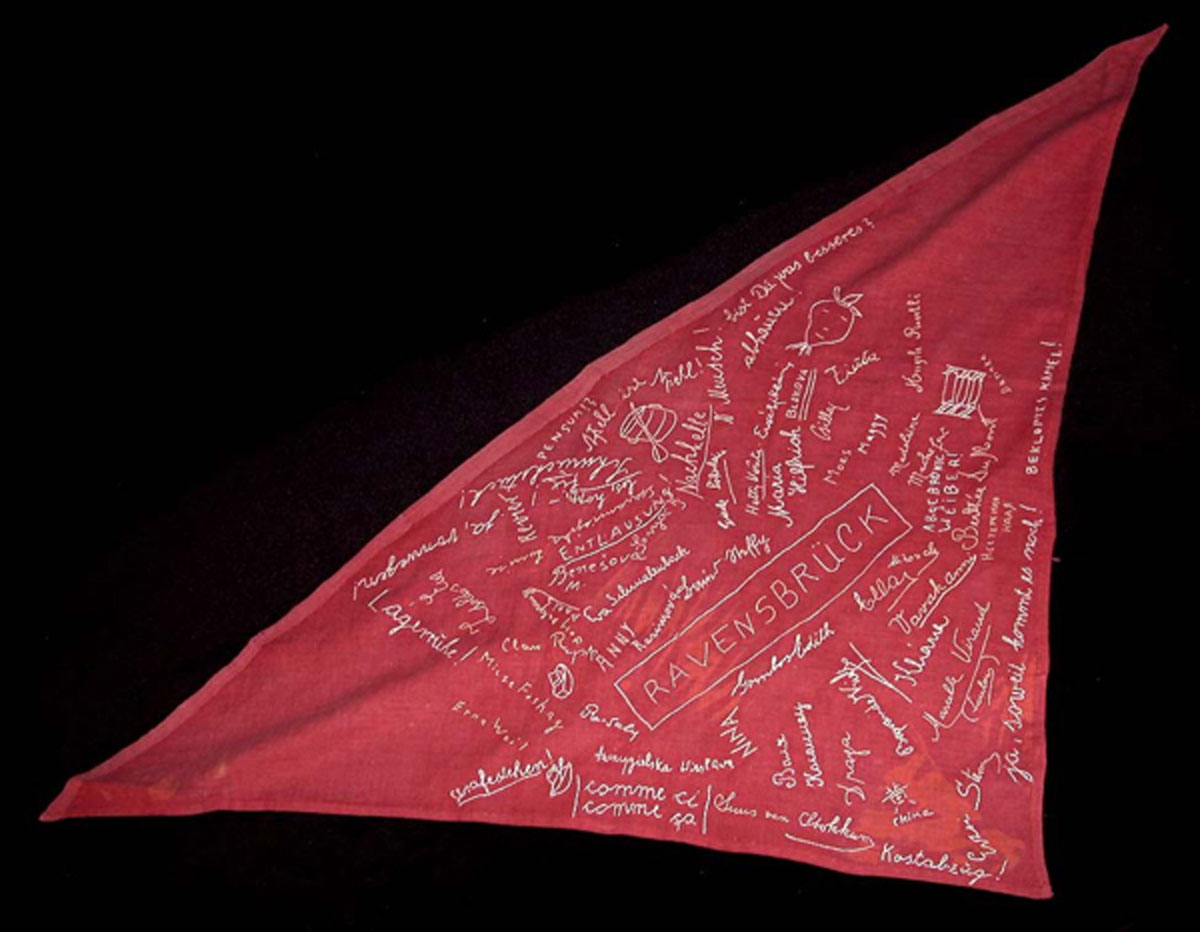- Rochelle G. Saidel, The Jewish Women of Ravensbrück Concentration Camp (Madison: The University of Wisconsin Press, 2004), p. 54.
- From the exhibition "Spots of Light", available on the Yad Vashem website
- From the exhibition "Spots of Light", available on the Yad Vashem website
Yehudit (Aufrichtig) Taube was born in Hungary in 1914 and immigrated to Amsterdam in 1938 where she worked as a nanny for a Jewish family. At the time of the German occupation, she was studying to be a beautician. In this capacity she met the wife of the Hungarian ambassador to the Netherlands, who supplied her with a false passport. Yehudit joined the resistance, distributing forged ration cards and food to Jewish families who were hiding on Dutch farms. Betrayed by a Dutch woman, she was deported in 1944 to Westerbork and then to Ravensbrück. There, she and her friends wrote "fantasy recipes".
As explained by Rochelle G. Saidel in The Jewish Women of Ravensbrück Concentration Camp, the book we feature in this newsletter, women who were starving "cooked with words – to bring back memories of home, assuage their constant hunger, and provide their campmates with food for thought in the true sense of the expression. They talked with each other about recipes and cooking, and sometimes they were fortunate enough to have a scrap of paper and a stub of pencil to write down their recipes."1 The recipes that were repeated sustained the humanity of those who talked about them, those who wrote them down, and those who repeated them, reminding them of home and giving them hope at a time when there was precious little hope to be had.
As the war came to a close, Yehudit joined the Bernadotte convoy and reached Sweden. She died in Israel in 2003. “We had low quality white paper. We took out a large sheet and folded it into small pieces. I brought a thread and a needle and sewed it so that it would not come apart, and we wrote in it. I will never forget how a Dutch woman told me. ‘I have pear kugel, write it down.’ I replied, ‘I've never eaten it, so I don't long for it.’ She insisted, ‘But it would give me such pleasure to talk about it.’ So I did her a favor and noted it down. The objective was to satiate our need for food. If you are hungry you don't care about anything but food.”2
The Note Sent to Yehudit
Yehudit and the friends mentioned above forged special bonds of solidarity while at Ravensbrück, which helped them weather the awful conditions at the camp. Yehudit's best friend was a woman named Edith Gombus. One day, when Yehudit was ill and missed the daily bread distribution, Edith brought Yehudit's bread for her, together with a note. The note shows the extent to which the solidarity between these women, expressed here through their food fantasies (in the face of the reality: the minimal food distributed to prisoners), helped them maintain their sanity, as well as their sense of humor. The note read:
Dear Julie,
I’m very sorry that we didn’t spend the day together in our lovely hall and didn’t have our meals together.
To allow you to get at least some mental pleasure from our meals, I’ll give you the details of the menu.
Breakfast: Karlsbad-style breakfast—eggs, butter, cheese, jam.
Brunch: At 10:00 we had yogurt, langus [a deep-fried yeast pastry], and a radish.
Lunch: potato soup with sour cream and laurel leaves, asparagus in sour cream and bread crumbs. Sunny-side-up egg and beef in tomato sauce with macaroni. Fried apple in vanilla sauce.
Afternoon: chocolate milk with whipped cream and egg bread with almonds and a “hornet’s nest” [a type of cake].
Supper: marrow, fried potatoes with onion, salad with green onion, little cookies and black coffee, fruit.
We gorged ourselves with Klari. We ate everything apart from a little slice of bread, which we saved for you.3
- 3. 3
Strip of Cloth
This strip of cloth was left over from a Nazi flag, and was signed by women prisoners in Ravensbrück. One of the signatories is Hetty Voute. Hetty Voute worked for the Dutch resistance and used to place endangered Jewish babies, whose parents had been deported, with families or institutions. She was arrested and sent to Ravensbrück. After the war she was named Righteous Among the Nations. Yehudit Taube embroidered the names, showing, again, the solidarity of this group of women.
Yad Vashem Artifacts Collection
Gift of Yehudit (Aufrichtig) Taube, Israel








